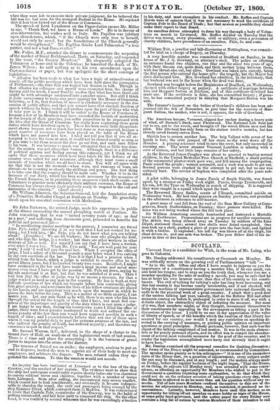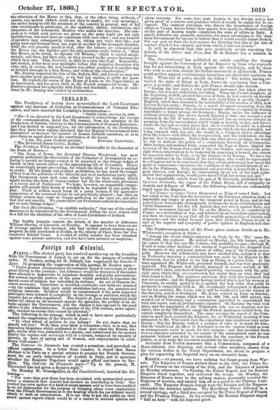SCOTLAND.
Viscount Bury is a candidate" for Wick, in-the room of Mr. Laing, who goes to Calcutta.
Mr. Dunlop addressed his constituents at Greenock on Monday. He was critically severe on the growing evil of Parliamentary " talk "—
" As to the talk. Often and often I have sought to impress on you the importance of a constituency hoeing a member who, if he can speak, can also hold his tongue, and to urge on you the truth that, whenever you see a member speaking for the sake of making a speech, you may be sure that he has at heart his own interest more than that of has country or his consti- tuents. The evil of talking for talking's sake has long been increasing, and this laid session it has become nearly intolerable, and if not checked, will bring the machine of representative government into universal disereilt, as unfit to do the practical work of a great country. I admit that a good deal of the useless talking last year, namely, that on the Reform Bill and other measures coming on before it, prolonged in order to stave it off, was with a definite object, the obittruttive object of defeating the measure. But most of it was, that members might, as they thought, recommend themselves to their constituents by appearing in the newspapers as teking a part in the discussions of the house. I yield to no one in my appreciation of the value of liberty of speech, or of the benefits which the exercise of that liberty has secured for our country, nor would I seek any restriction on speaking di- rected to the carrying of ineasures or guiding public opinion on important questions or great principles. Nobody pretends, however, that such was the object of the talking complained of last session. It was lathe main obstruc- tive or for purely personal objects, and its effect was to compel the abandon- ment of several most valuable measures for the good of the country, and to render the legislation accomplished more hasty and slovenly than it ought to have been.
Mr. Dunlop examined all the proposed remedies for limiting discussion ; the forms of the House might be amended, as recommended by Committees. The speaker spoke plainly as to his colleagues—" It is one of the anomalous rules of the Rouse that, on a question of adjournment, every subject under the sun may be discussed, and at any length; and the motion always made on Friday, before the regular business of the night began' That the House, at its rising, no adjourn till Monday next,' was attended with some conve- nience, as affording an opportunity for Members who wiehed to put to the Government a-question requiring some explanation, to do that which they could not do on the ordinary occasion of asking questions every day, when the Member is allowed to do no more than ask his question without any re- marks. Till of late years Members confined themselves to this use of the motion for adjournment to Monday, and, so restricted, it produced no in- convenience. Latterly, however, Members have used this motion as an opportunity for tilting off set speeches on some hobby or topic of the House, or some petty local grievance, and the notice paper for every Friday now -contains a long list of notices by various Members of their intention to call the attention of the House to this, that, or the other thing, without, of course, any motion (which could not then be made)" the real meaning o the notice being to call the attention of the country in general, and of hif -own constituents in particular, to the assiduity, ability, information, and eloquence of the honourable Member who makes the speeches. The sub- jects as to which each notices are given on the same night are not only multifarious, but need have no connexion with each other and any number of speakers may subsequently chime in, taking any topic they like, and going back and forward from one topic to another in the strangest disorder, while the only possible result is that, after the talkers are exhausted and the House too, the Speaker puts the only question really before it, 'That this House, at its rising, do adjourn till Monday,' which is carried unani- mously, and then, but then only, do they proceed to the proper business for which they met. This, however, is often at a very late hoar. Repeatedly, last session, it has been near midnight before this irregular discussion was over, and of course, the real business was either postponed to another day or hurried through in a thin House, and without due consideration."
Mr. Dunlop lamented the fate of the Reform Bill, and feared we may not have another good opportunity, as we had last session, to settle the ques- tion. He regards the course of the House of Lords on the Paper-duties as an innovation, and has great faith in the French commercial treaty. Mr. Dunlop expressed his sympathy with Italy and Garibaldi. A vote of confi- Aence in Mr. Dunlop was carried by acclamation.



























 Previous page
Previous page